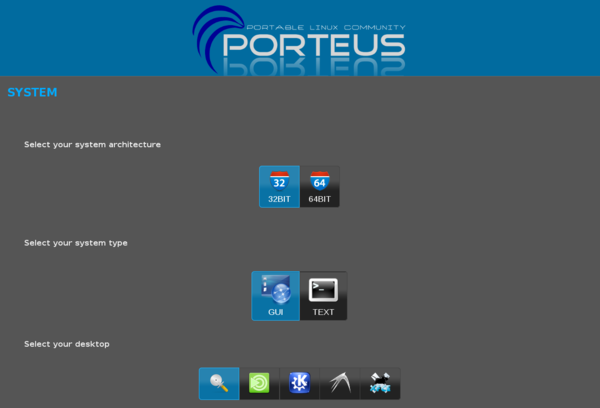Build Your Own Portable Linux Distro with Porteus

Productivity Sauce
Building a customized Linux distribution can be a daunting proposition -- unless you use Porteus Wizard. This clever and simple service lets you create a custom Live CD distro that fits a USB stick and loads in RAM. The best part is that you don't need any particular Linux skills to build your own distro. The wizard allows you to select and configure a handful of options, and the entire process takes only a few minutes.
Pick the desired architecture, desktop environment, and applications as well as configure basic settings such as timezone and keyboard. Once you've done that, hit the Build button, and your freshly-baked Linux distro should be ready for download almost instantaneously. The resulting distro is based on Porteus, a Slackware-based distribution optimized to run from removable storage devices. To install the created distro onto a USB stick, use the dd tool to write the content of the ISO image to the stick. Switch then to the /boot directory on the USB stick and run the Porteus-installer-for-Linux.com script to finish the installation. Similar to other Live CD distros, your very own version of Porteus supports a wide range of cheatcodes stored in the /boot/docs directory. The cheatcodes are also available for your perusal on the dedicated Cheatcodes page.
comments powered by DisqusSubscribe to our Linux Newsletters
Find Linux and Open Source Jobs
Subscribe to our ADMIN Newsletters
Support Our Work
Linux Magazine content is made possible with support from readers like you. Please consider contributing when you’ve found an article to be beneficial.

News
-
Keep Android Open
Google has announced that, soon, anyone looking to develop Android apps will have to first register centrally with Google.
-
Kernel 7.0 Now in Testing
Linus Torvalds has announced the first Release Candidate (RC) for the 7.x kernel is available for those who want to test it.
-
Introducing matrixOS, an Immutable Gentoo-Based Linux Distro
It was only a matter of time before a developer decided one of the most challenging Linux distributions needed to be immutable.
-
Chaos Comes to KDE in KaOS
KaOS devs are making a major change to the distribution, and it all comes down to one system.
-
New Linux Botnet Discovered
The SSHStalker botnet uses IRC C2 to control systems via legacy Linux kernel exploits.
-
The Next Linux Kernel Turns 7.0
Linus Torvalds has announced that after Linux kernel 6.19, we'll finally reach the 7.0 iteration stage.
-
Linux From Scratch Drops SysVinit Support
LFS will no longer support SysVinit.
-
LibreOffice 26.2 Now Available
With new features, improvements, and bug fixes, LibreOffice 26.2 delivers a modern, polished office suite without compromise.
-
Linux Kernel Project Releases Project Continuity Document
What happens to Linux when there's no Linus? It's a question many of us have asked over the years, and it seems it's also on the minds of the Linux kernel project.
-
Mecha Systems Introduces Linux Handheld
Mecha Systems has revealed its Mecha Comet, a new handheld computer powered by – you guessed it – Linux.

